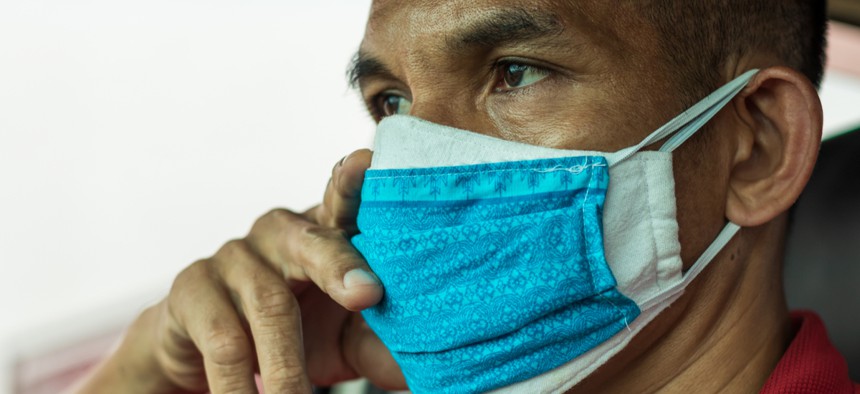Snug and Doubled-Up Masks Can Help Stop Covid Spread, CDC Finds

Kaentian Street/Shutterstock.com
The U.S. Centers for Disease Control and Prevention released new research looking at the effectiveness of wearing two masks at once, or tighter fitting face coverings.
People could possibly help to cut down on the spread of the coronavirus by wearing two face masks layered together and making sure that even a single mask fits snugly on their faces, according to research federal health officials released Wednesday.
The laboratory study from the U.S. Centers for Disease Control and Prevention involved experiments where artificial heads were exposed to particles that were meant to simulate aerosols from coughs and breath that can spread Covid-19.
A key finding is that—compared to not wearing a mask—either donning a face cover that is tightly fitting, or wearing one mask over another, can reduce a person's exposure to the potentially risky airborne particles by roughly 96% on average.
CDC looked at a method for making a mask fit tighter that involves knotting the ear loops and tucking in excess material next to the face.
In the experiments, an artificial head mimicking a person exhaling breath was fitted with a surgical mask that was unknotted. That covering reduced the particles that reached the other figure, 6 feet away, by about 40% compared to a scenario with no masks.
When both figures were fitted with the unknotted masks, that reduction improved to 84%.
The decreases in the the 96% range with the airborne particles reaching the figure exposed to the fake breath came when medical masks on both heads were cinched down with the knots and sealed with folds, or otherwise doubled-up with cloth coverings.
"Masks work and they work best when they have a good fit and are worn correctly," Dr. Rochelle Walensky, director of the CDC, said during a press briefing on Wednesday.
She said that the new data from CDC underscores the importance of people wearing properly-fitting masks over their noses and mouths. Moldable nose wires and so-called "mask fitters" are other ways people can get a snugger fit, she added.
White House spokeswoman Jen Psaki on Wednesday noted that the study does not mean the CDC is issuing definitive guidance that urges people to wear two masks, but added that the research does indicate that there are benefits in having a well-fitting face covering.
CDC on its website now highlights the masking options it tested—doubling up and knotting and folding—as ways to achieve a better mask fit and extra protection against the virus.
The researchers behind the mask study point out that it has limitations.
For instance, the experiments only tested one type of medical mask and one type of cloth mask in a controlled setting. A report on the study warns that the findings should not be generalized to the usefulness of all similar masks, or interpreted as representative of the effectiveness of masks when worn in real-world settings.
President Biden has made masking central in his administration's strategy to defeat the coronavirus, which has now upended many aspects of American life for nearly a year. Public health experts and others have emphasized that masks will remain a key line of defense in the months ahead as the Covid-19 vaccine rollout continues.
Throughout the virus outbreak masks, and state and local government orders calling for people to wear them in public and around others from outside their households, have been a flashpoint.
"Anti-mask" protestors have demonstrated at state capitols, outside the homes of government officials, and at grocery stores and other businesses, arguing in many cases that directives to wear masks are an infringement on their personal freedoms.
Meanwhile, in cities and towns across the country, it's possible to spot people wearing different types of face coverings in a variety of ways—ranging from loose bandanas, to stretchy neck-warmer-style fabric, to surgical masks over just their mouths, to the sorts of tighter-fitting and double mask systems the CDC researchers tested.
Walensky acknowledged that many people are weary of hearing about masks and wearing them, but said scientific research makes clear they're an effective public health measure.
"To get the most protection possible, we all have to wear them," she said, adding: "Now is not the time to roll back mask requirements."
NEXT STORY: Quick Hits






